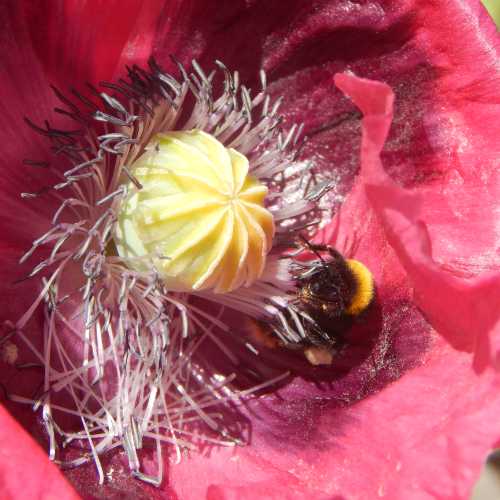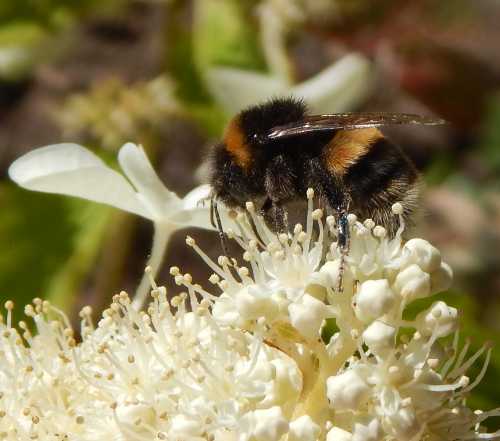Bees Dying?
Are you generally concerned about bees dying and bee decline? Have you found dead bees?
Certainly, all creatures live and die, but there is normal rate of death, bees dying usually because of specific human actions, and then there is the general worrying decline of bees and other pollinators.
In summary, this website looks at the following issues:
- pesticide poisoning - slow death (known as chronic mortality) or very fast and sudden/immediate death (known as acute mortality).
- natural death - all creatures die for various reasons: age, predator attack, accident, parasites and so on.
- general bee and pollinator decline - due to a combination of factors, such as habitat loss, disease, mites and so on, but also including pesticides, and mostly due to the activity of humans.
Below you will find links relating to each of the themes above.
Bees Dying From Pesticide Poisoning
There is concern about a group of pesticides called neonicotinoids. They, and other pesticides, have been linked to colony collapse disorder, and certainly neonicotinoids are the primary suspect in large scale honey bee deaths and sudden colony losses.
As I write in May 2014, I have been investigating this issue and campaigning for over 5 years. There is evidence across the globe that neonicotinoids kill bees. For further resources on this website, many referencing scientific studies and agrochemical company literature, see Neonicotinoids and bees
Bees Dying From Natural Causes
You may have found several dead bees. It may be perfectly natural, or there may be a problem. For example, predator attack within a bumble bee nest can result in a small number of dead bumble bees around the nest entrance. This a normal occurrence and there is little you can do about it. In this case, it may be that the colony will thrive - they are simply removing dead bees to preserve hygiene within the nest.
Take a look at my page for further information: Dead Bees. If you have found a bedraggled looking bee that may benefit from your help, take a look at my page explaining what to do if you have found a bee.
I would also advocate leaving bumble bee nests alone. It is disappointing to learn of people having bumble bee nests (or solitary bee nests) destroyed unnecessarily, in the fear of being stung, despite the fact that most wild bees are docile, and some cannot sting. In addition to which, nests are often temporary!
General Bee Decline
There are a variety of reasons why bees are dying or declining, and they can be traced to man’s activities. Hence, is it not right that we humans make efforts to put things right?
Habitat destruction, intensive farming practices,
pesticide use….the list goes on. In recent years, new potential problems have arisen, such as the spread of disease by commercially reared bumble bees to wild species. Importation of plants and trees can not only spread diseases to native plants, it can in turn threaten species dependent on them. A further potential issue is the introduction of plant or tree species which can be harmful in other ways, such as imported lime trees which seem to have toxic effects on bees which find the nectar they produce irresistible.
Then there is the issue of commercial rearing of bumble bees and potential spread of diseases to other bees, and the unnecessary destruction of bee nests.
Wild Bees And Other Insect Pollinators
Many of the concerns about bees dying are associated with honey bees. Increasingly, however, it is recognised that almost all of our pollinators are in trouble.
Honey bees are very important, and they are enchanting creatures, but they do not pollinate everything. Hence we should look after other pollinators too. This is important to recognise, because:
- When governments offer financial assistance to beekeepers this will help honey bees only, it will not resolve the wider issues. However, this is not to say that honey bees do not matter. See my page: why honey bees matter.
- When governments offer assistance to make it easier for agrochemical companies to produce their 'bee medicines', again, this targets honey bees (and is a controversial policy in any case - see this page about honey bee health).
- Producing more honey bee colonies could give a false impression regarding the health of the environment and could even mislead people into thinking 'all is well with pollinators'. Unfortunately, whilst we can breed more honey bees, we cannot breed more of
every other pollinating bee, beetle, butterfly or bug. As an example,
read more about the status of
bumble bees,
and other
insect pollinators.
Find out why
wild bees
are such important pollinators.
What can you and I do to help prevent more bees dying?
Together we make a difference! And it's not rocket science... three basic things you can do are:
If you found this page helpful or interesting, I'd really be grateful if you would share it with others - if not this page, perhaps another, such as Gardening For Bees.
Thank you so much :) .

